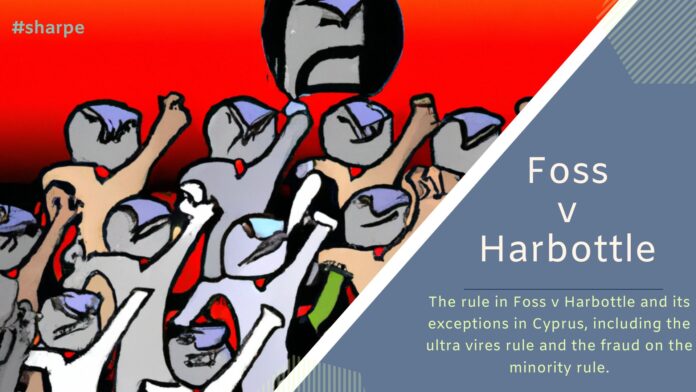Introduction to Foss v Harbottle in Cyprus
The rule in Foss v Harbottle is a principle of English company law that states that only a company’s members (i.e., shareholders) have the right to bring a lawsuit on behalf of the company. This means that, in general, the majority’s decisions are binding on the minority, and individuals who suffer harm as a result of the actions of a company cannot sue in their own name; instead, they must rely on the company’s members to bring a lawsuit.
The Majority Rule in Cyprus
In Cyprus, the rule in Foss v Harbottle has been adopted into local law and applies to companies incorporated in Cyprus. This means that, in general, the majority rule applies to Cyprus companies, and only the members of a Cyprus company have the right to bring a lawsuit on behalf of the company.
Exceptions to the Majority Rule
However, there are several exceptions to this rule that allow individuals to bring a lawsuit in their own name, even if they are not members of the company. These exceptions include:
A. The ultra vires rule
The ultra vires rule allows individuals to bring a lawsuit if the company’s actions exceed its legal powers or purposes. This means that if a company takes actions that are not authorized by its articles of association or that are not in line with its stated objectives, then individuals who have been harmed by these actions can bring a lawsuit to seek remedies.
B. The personal right rule
The personal right rule allows individuals to bring a lawsuit if they have a personal right that has been infringed by the company’s actions. This means that if an individual has a specific right as a shareholder (such as the right to receive dividends or the right to vote on important matters), and this right has been infringed by the company’s actions, then the individual can bring a lawsuit to seek remedies.
C. The fraud on the minority rule
The fraud on the minority rule allows individuals to bring a lawsuit if the majority has engaged in fraudulent conduct that has prejudiced the interests of the minority. This means that if the majority has engaged in conduct that is fraudulent, deceitful, or dishonest, and this conduct has harmed the interests of the minority shareholders, then the minority can bring a lawsuit to seek remedies.
IV. Examples of the Exceptions in Practice
In Cyprus, these exceptions to the rule in Foss v Harbottle have been applied in various cases to allow individuals to bring lawsuits against companies in their own name. For example, in the case of Karageorgis v Demetriades, the plaintiff was able to bring a lawsuit against the company for exceeding its legal powers (ultra vires) by entering into a contract that was not in the company’s best interests. In the case of Neophytou v Christodoulou, the plaintiffs were able to bring a lawsuit against the company for infringing their personal rights as shareholders. And in the case of Christodoulou v Leptos Estates Ltd., the plaintiffs were able to bring a lawsuit against the majority shareholders for engaging in fraudulent conduct that prejudiced the interests of the minority.
V. Conclusion
Overall, the rule in Foss v Harbottle is an important principle of company law in Cyprus, but it is subject to several exceptions that allow individuals to bring lawsuits in their own name in certain circumstances. These exceptions serve to protect the rights of minority shareholders and to ensure that the interests

